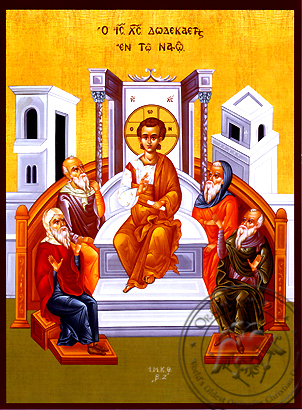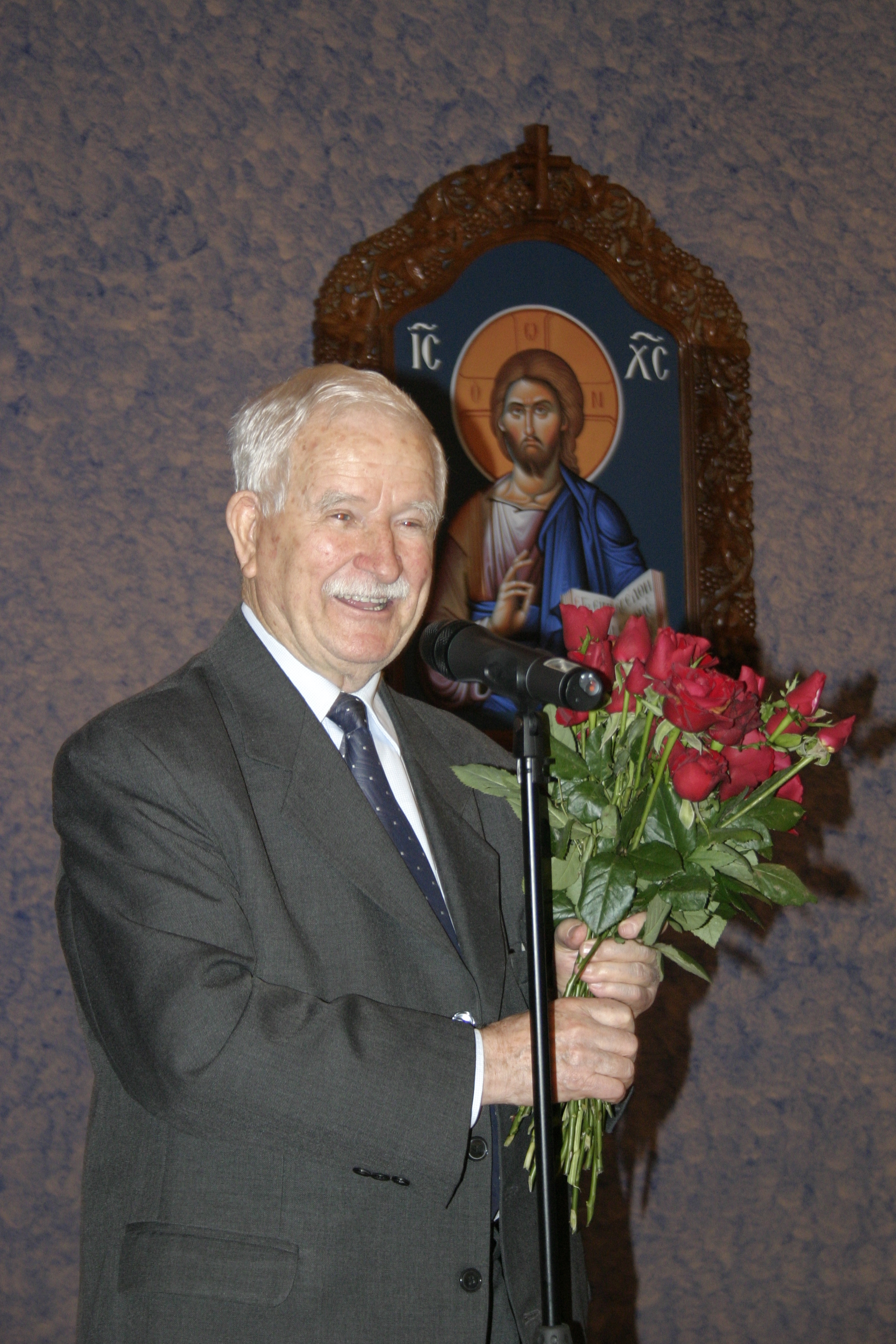Translation from the book:
Στεργίου Ν. Σάκκου, Ἑρμηνεία στό κατά Λουκᾶν Εὐαγγέλιο, τόμ. Α΄,
ἐκδ. «ΧΡΙΣΤΙΑΝΙΚΗ ΕΛΠΙΣ» ΟΡΘΟΔΟΞΗ ΑΔΕΛΦΟΤΗΤΑ, Θεσ/νίκη 2008, σσ. 122-130
(Stergios N. Sakkos [Read CV], A Commentary on the Gospel according to St. Luke, vol. A', pp. 122-130)
It was the first time in 2:41-52 when Jesus revealed who he was, that God is his father. It is particularly interesting that already at the age of twelve Jesus identified himself as the Son of God. Then, during his public ministry, he gradually revealed his God-man nature through his preaching and signs. This passage also informs us where and how Jesus lived until the beginning of his public ministry, up to the age of thirty.
2,41. Καὶ ἐπορεύοντο οἱ γονεῖς αὐτοῦ κατ᾿ ἔτος εἰς Ἰερουσαλὴμ τῇ ἑορτῇ τοῦ πάσχα.
2:41 His parents went to Jerusalem every year at the feast of the passover.
The family environment in which Jesus was born and raised was distinguished for the reverent observance of their ancestors’ Judaic traditions. According to the law (see Ex 23:14-17; 34:23-24; Lev ch. 23; Deut 16:1-17), the pious Israelites visited the temple of Solomon every year on the three great feasts: Passover, Pentecost and Tabernacles. Later, due to the dispersion in various places this was not easy. The people of Palestine, however, tried to go to the temple at least once a year. The law required only men to attend the feasts (see Ex 34:23). However, any pious women who wished to go were also allowed to be there. Mary followed Joseph “every year”, to Jerusalem on the feast of the Passover.
The distance from Nazareth to Jerusalem was quite significant. The journey, which was made on foot or by animal, took about three days. Many times, the Samaritans prevented the Jews from passing through their country or the Jews themselves avoided passing through Samaria. So, they had to cross the Perea in order to avoid Samaria. The journey became more tiring and time-consuming. But their desire to get to God’s temple and meet with other brethren, overcame all obstacles. On their ascent to Jerusalem, they sang the “Song of Ascents” (see Ps 120-134 (119-133).
2,42. Καὶ ὅτε ἐγένετο ἐτῶν δώδεκα, ἀναβάντων αὐτῶν εἰς Ἰεροσόλυμα κατὰ τὸ ἔθος τῆς ἑορτῆς.
2:42 And when he was twelve years old, they went up to Jerusalem according to the custom of the feast.
Every year Joseph and Mary went to Jerusalem on the days of the Passover but it is not stated whether they took Jesus with them. In the incident recorded by Luke, it was probably the first time Jesus had ever gone up to Jerusalem. According to the rabbis’ teaching, the boy of a Jewish family was to begin his sacred studies at the age of five. When he was in his twelfth year, he was to know Yahweh’s whole law, he was called “son of the law”, was considered an adult and was obliged to observe the legal regulations as an adult. At this age he also began to attend the synagogue.
In the earlier years Joseph and Mary probably did not take Jesus in Jerusalem, because they considered it dangerous for him to appear there, while King Archelaus was in power (see Mt 2:22-23). He was Herod’s son, just as wicked as his father who murdered the little children. But after nine years of reigning, Archelaus had already been exiled to Switzerland. To this nine-year period, if we add two more years, corresponding to the age of Jesus on his return from Egypt, we conclude that Archelaus' exile coincided with the completion of Jesus' eleventh year. Therefore, Jesus who was twelve years old, could have been presented fearlessly in Jerusalem.
For the expression “they went up to Jerusalem” see comments on 2:4.
2,43. καὶ τελειωσάντων τὰς ἡμέρας, ἐν τῷ ὑποστρέφειν αὐτοὺς ὑπέμεινεν Ἰησοῦς ὁ παῖς ἐν Ἰερουσαλήμ, καὶ οὐκ ἔγνω Ἰωσὴφ καὶ ἡ μήτηρ αὐτοῦ.
2:43 And when they had fulfilled the days, as they returned, the boy Jesus remained behind in Jerusalem, and Joseph and his mother did not know it.
Seven days lasted the celebration of the Passover, during which the Jews ate unleavened bread (see Lev 23:6; Deut 1:3), as their ancestors had eaten before they had left Egypt (see Ex 12:8; 15). The believers, however, were obliged to stay in Jerusalem on the two main days of the feast. They made sure they were there on the eve of the 14th of Nisan, ate the Passover lamb with bitter greens, and left on the third day. Many, of course, who came from distant lands stayed in the holy city until they also celebrated Pentecost (cf. Acts 2:5). The Galileans, poor people, usually came for two or three days and then returned to their work; those who could, came again for Pentecost. Luke notes “when they had fulfilled the days” to show that the holy family remained in Jerusalem for the seven days of the feast.
Joseph and the virgin Mary, therefore, after the end of the feast, set out for their homeland. But Jesus did not return with them; he “remained”, he stayed behind. By divine providence, “Joseph and his mother did not know it” did not perceive Jesus’ absence, lest they should prevent him from fulfilling his plan. Many, of course, wonder how it was possible that the parents could not have been aware of the child's absence during the whole day. The question is solved in the following verses.
2,44-45. Νομίσαντες δὲ αὐτὸν ἐν τῇ συνοδίᾳ εἶναι ἦλθον ἡμέρας ὁδὸν καὶ ἀνεζήτουν αὐτὸν ἐν τοῖς συγγενέσι καὶ ἐν τοῖς γνωστοῖς· καὶ μὴ εὑρόντες αὐτὸν ὑπέστρεψαν εἰς Ἰερουσαλὴμ ζητοῦντες αὐτόν.
2:44-45 But they, supposing him to have been in the company, went a day's journey; and they sought him among their relatives and acquaintances; and when they did not find him, they returned to Jerusalem, seeking him.
All those who travelled to Jerusalem formed a great caravan. The women with the little children marched in front, and the men with the older ones behind. So, Jesus' mother thought that the child was with Joseph, while Joseph thought that Jesus was with his mother. After all, they trusted him completely. His exemplary obedience and his amazing prudence had never caused them any worry. So, they did not seek him out until the time they had to settle in for the night. Because they could not find him among the relatives and acquaintances, among whom they sought him, they returned to Jerusalem.
2,46-47. Καὶ ἐγένετο μεθ᾿ ἡμέρας τρεῖς εὗρον αὐτὸν ἐν τῷ ἱερῷ καθεζόμενον ἐν μέσῳ τῶν διδασκάλων καὶ ἀκούοντα αὐτῶν καὶ ἐπερωτῶντα αὐτούς· ἐξίσταντο δὲ πάντες οἱ ἀκούοντες αὐτοῦ ἐπὶ τῇ συνέσει καὶ ταῖς ἀποκρίσεσιν αὐτοῦ.
2:46-47 After three days they found him in the temple, sitting among the rabbis, listening to them and asking them questions; and all who heard him were amazed at at his intelligence and his answers.
Jesus was found “after three days”; on the evening of the first day Joseph and the Virgin realized his absence, on the second day they returned -"went a day's journey" again (v. 44)- and on the third they found him. He was “in the temple”, in one of the galleries where the teachers of the law taught. It seems that even after the end of the feast some Jews of the diaspora remained in Palestine. The pious teachers stayed in the temple and taught God’s law. Jesus participated in such a group, too.
 The expression “sitting among the rabbis” shows that the Lord took the place of the teacher. He was evidently listening to the rabbis’ teaching and was asking his questions as a disciple, since Joseph and the virgin Mary found him “listening to them and asking them questions”. But such was his wisdom that he quickly turned his teachers into disciples. There were, moreover, certain issues which the rabbis ignored and others which they misunderstood. Jesus clarified many points, answered questions, and offered valuable knowledge. Everyone who heard him was “amazed”, astonished, and filled with admiration. A twelve-year-old child made them hang on his every word!
The expression “sitting among the rabbis” shows that the Lord took the place of the teacher. He was evidently listening to the rabbis’ teaching and was asking his questions as a disciple, since Joseph and the virgin Mary found him “listening to them and asking them questions”. But such was his wisdom that he quickly turned his teachers into disciples. There were, moreover, certain issues which the rabbis ignored and others which they misunderstood. Jesus clarified many points, answered questions, and offered valuable knowledge. Everyone who heard him was “amazed”, astonished, and filled with admiration. A twelve-year-old child made them hang on his every word!
It is not stated what the subject of their discussion was. It might had been on the hot issue which preoccupied the Jews: the coming of the Messiah, the hope of Israel, the redemption. Perhaps he explained to them that the kingdom of the Son of Man would not be earthly, perhaps he would also allude to his passion. We do not know for sure. But we can assume all these, as they became later Jesus’ preaching and revelation.
2,48. Καὶ ἰδόντες αὐτὸν ἐξεπλάγησαν, καὶ πρὸς αὐτὸν ἡ μήτηρ αὐτοῦ εἶπε· τέκνον, τί ἐποίησας ἡμῖν οὕτως; ἰδοὺ ὁ πατήρ σου κἀγὼ ὀδυνώμενοι ἐζητοῦμέν σε.
2:48 When they saw him, they were astonished and his mother said to him; "My child, why have you behaved thus to us? Behold your father and I have been searching for you anxiously."
Joseph and the virgin Mary “were astonished”, marvelled and wondered at the place where they found the child, and at the words which they heard. As is evident from their surprise, they did not immediately interrupt him, but listened to his dialogue with the teachers who surrounded him. There were also some other instances for which they were amazed because of the little Jesus (see Lk 2:18. 33). Now another fact was added that made a special impression on them.
With the anxiety of a loving mother, Mary was the first to speak. She, after all, was more closely connected with the child than Joseph. She did not, of course, rebuke Jesus. She expressed her wonder, “why have you behaved thus to us”, she is unaware of the reason for his action which caused them disturbance and sorrow. “Your father and I have been searching for you anxiously" his mother emphasized. As it is known from the historians of that time, Palestine was living through days of great political upheaval and national turmoil. Jerusalem, as a national and religious centre, was the focus of revolutions and rebellions against the conquerors. It became therefore, obvious that the parents' anxiety over the absence of young Jesus, was intensified.
Mary called Joseph Jesus’ "father", because that was how he appeared in the people’s eyes.
2,49. Καὶ εἶπε πρὸς αὐτούς· τί ὅτι ἐζητεῖτέ με; οὐκ ᾔδειτε ὅτι ἐν τοῖς τοῦ πατρός μου δεῖ εἶναί με;
2:49 And he said to them, "How is it that you sought me? Did you not know that I must be in my father's house?"
This short verse reveals great truths. Some argue that Jesus' conversation with his mother took place in private, when they had already departed from the teachers. But Jesus' response, which shows his intention to reveal his divine nature, does not lead to such a conclusion.
Jesus rebuked his parents because they were worried. Was it possible for him to be lost? Shouldn't they have known where to find him after all the hints they had about him? Moreover, when his mother said to him, "your father and I have been searching for you anxiously", Jesus gently but firmly corrected her, saying, "Did you not know that I must be in my father's house?" She spoke to him of his supposed father; but he revealed his real father, revealing that he is God’s Son (cf. Jn 5:18). These are Jesus’ first words, recorded in the Gospels, his first preaching, before he even began his public ministry.
No one before Jesus called God his father. Later, through the Sunday prayer, he taught his disciples to call him so. This is the name of God, which Jesus revealed -according to his word "I have manifested your name to men" (Jn 17:6)- that God is triune and is our Father. This sweet name we ourselves also pronounce. For Jesus, of course, God is his natural father but we are his children thanks to his grace (cf. Jn 20:17; Rom 8:14-17; Gal 4:6-7).
2,50. Καὶ αὐτοὶ οὐ συνῆκαν τὸ ῥῆμα ὃ ἐλάλησεν αὐτοῖς.
2:50 And they did not understand the saying which he spoke to them.
Luke inserted this verse into the narrative of this incident, probably an explanation of the Virgin herself, to show that Jesus' words contain a depth that could not be explored. Joseph and Mary gradually penetrated it. At that particular moment they could not understand why Jesus made this revelation, the proclamation that God is his Father. Would he begin his public ministry or would he continue to be with them?
2,51. Καὶ κατέβη μετ᾿ αὐτῶν καὶ ἦλθεν εἰς Ναζαρέτ, καὶ ἦν ὑποτασσόμενος αὐτοῖς. Καὶ ἡ μήτηρ αὐτοῦ διετήρει πάντα τὰ ῥήματα ταῦτα ἐν τῇ καρδίᾳ αὐτῆς.
2:51 And he went down with them and came to Nazareth, and was obedient to them. And his mother kept all these incidents in her heart.
The phrase “was obedient to them” briefly summarizes Jesus’ life up to the age of 30 years old. Jesus is a model of submission for all children. He, to whom everything is submitted, submitted to Joseph and worked with him! Not even to angels were granted such an honor to that which was done to Jesus’ "parents". Indeed, after the event described in this passage, it seemed that he could be freed from their guardianship. But until he took up his public ministry, he continued to live humbly and informally, poorly and simply, in obedience to Joseph, his supposed father, and to the virgin Mary, his mother. His life in its outward behavior was like that of the other children of the peasants. He spent his days in silence and obscurity, occupied with the daily chores of the family, like David who was caring for his father's sheep, like Jeremiah in his priestly family in the Anathoth of the Benjamin’s land, like Amos in the little town of Tekoa among his sheep and the sycamore trees which he cultivated.
Nowhere else in the rest of the Gospel do we find Joseph. We conclude from this that Joseph died before Jesus began his public ministry.
The Virgin always “kept all these incidents in her heart”, she kept in her heart all the miraculous events concerning Jesus (cf. v. 19). Much more, of course, she kept as a precious treasure the words and deeds of her own son. Besides, mothers undoubtedly record in their memory with historical consistency the details of their children's early years. The evangelist Luke's observations on the inner world of the virgin Mary is another proof that reinforces the view that Jesus’ mother was the basic and fully reliable source of his information.
2,52. Καὶ Ἰησοῦς προέκοπτε σοφίᾳ καὶ ἡλικίᾳ καὶ χάριτι παρὰ Θεῷ καὶ ἀνθρώποις.
2:52 And Jesus increased in wisdom and in stature, and in favor with God and man.
Luke points out the threefold progress that Jesus displayed as a child; he increased in wisdom and in stature, and in favor with God and man. That is, the more he grew in age, the more his wisdom (see comments on v. 40) and grace increased in the eyes of God and men; "he satisfied God with his deeds and people praised him".
Copyright © 2021 by Orthodox Christian Association «ΧΡΙΣΤΙΑΝΙΚΗ ΕΛΠΙΣ» ΟΡΘΟΔΟΞΗ ΑΔΕΛΦΟΤΗΤΑ. Used by permission. All rights reserved.










